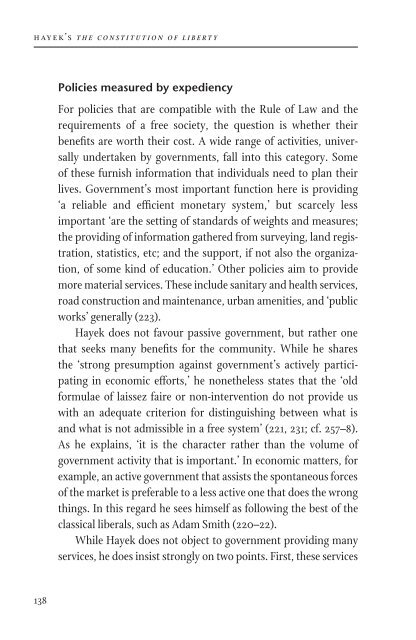Hayek's The Constitution of Liberty - Institute of Economic Affairs
Hayek's The Constitution of Liberty - Institute of Economic Affairs
Hayek's The Constitution of Liberty - Institute of Economic Affairs
You also want an ePaper? Increase the reach of your titles
YUMPU automatically turns print PDFs into web optimized ePapers that Google loves.
h ay e k ’ s t h e c o n s t i t u t i o n o f l i b e r t y<br />
e c o n o m i c p o l i c y a n d t h e r u l e o f l aw<br />
Policies measured by expediency<br />
For policies that are compatible with the Rule <strong>of</strong> Law and the<br />
requirements <strong>of</strong> a free society, the question is whether their<br />
benefits are worth their cost. A wide range <strong>of</strong> activities, universally<br />
undertaken by governments, fall into this category. Some<br />
<strong>of</strong> these furnish information that individuals need to plan their<br />
lives. Government’s most important function here is providing<br />
‘a reliable and efficient monetary system,’ but scarcely less<br />
import ant ‘are the setting <strong>of</strong> standards <strong>of</strong> weights and measures;<br />
the providing <strong>of</strong> information gathered from surveying, land registration,<br />
statistics, etc; and the support, if not also the organization,<br />
<strong>of</strong> some kind <strong>of</strong> education.’ Other policies aim to provide<br />
more material services. <strong>The</strong>se include sanitary and health services,<br />
road construction and maintenance, urban amenities, and ‘public<br />
works’ generally (223).<br />
Hayek does not favour passive government, but rather one<br />
that seeks many benefits for the community. While he shares<br />
the ‘strong presumption against government’s actively participating<br />
in economic efforts,’ he nonetheless states that the ‘old<br />
formulae <strong>of</strong> laissez faire or non-intervention do not provide us<br />
with an adequate criterion for distinguishing between what is<br />
and what is not admissible in a free system’ (221, 231; cf. 257–8).<br />
As he explains, ‘it is the character rather than the volume <strong>of</strong><br />
government activity that is important.’ In economic matters, for<br />
example, an active government that assists the spontaneous forces<br />
<strong>of</strong> the market is preferable to a less active one that does the wrong<br />
things. In this regard he sees himself as following the best <strong>of</strong> the<br />
classical liberals, such as Adam Smith (220–22).<br />
While Hayek does not object to government providing many<br />
services, he does insist strongly on two points. First, these services<br />
must be available to all. No citizen can be excluded arbitrarily<br />
from their enjoyment. Second, government must not forcibly<br />
monopolise the provision <strong>of</strong> these services or enjoy any special<br />
advantage in <strong>of</strong>fering them. If possible private suppliers must be<br />
allowed to compete with government enterprise, or at least the<br />
door must not be shut to them. Both arbitrary exclusion and sheltered<br />
monopoly make state coercion impermissible.<br />
<strong>The</strong> community’s interest<br />
<strong>The</strong> highest standard for judging policy is neither the Rule <strong>of</strong><br />
Law nor expediency, but the interest <strong>of</strong> the community. As noted<br />
earlier, government can in emergencies suspend individual rights<br />
if the community’s interest requires it. In ‘normal’ times, government,<br />
acting within the Rule <strong>of</strong> Law, pursues an expedient course;<br />
but expedient actions must aim towards an end, which ultimately<br />
is the community’s interest.<br />
What policy measures can be justified by expediency, especially<br />
when it comes to coercing individuals? Some <strong>of</strong> Hayek’s<br />
formulations suggest that governmental coercion must be limited<br />
to cases where individuals have violated the law, especially by<br />
harming others: ‘Under the rule <strong>of</strong> law, government can infringe<br />
a person’s protected private sphere only as punishment for<br />
breaking an announced general rule’ (206). This statement would<br />
indicate that only lawbreakers need fear government’s coercive<br />
hand. As Hayek proceeds, however, it becomes clear that governmental<br />
coercion need not be a form <strong>of</strong> punishment. Government<br />
can coerce even law-abiding individuals if the community’s<br />
interest requires it, so long as it does so in conformity to a general<br />
rule and allows for review by independent courts (225).<br />
138<br />
139












